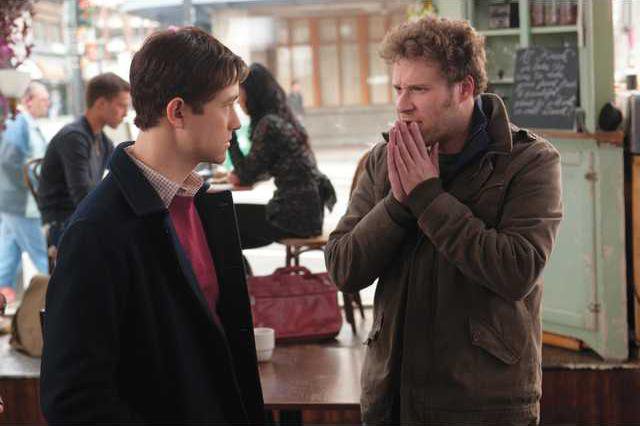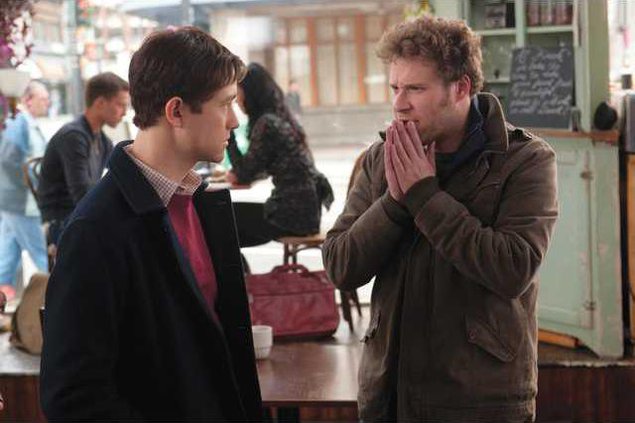'50/50'
Starring: Joseph Gordon-Levitt, Seth Rogen, Anna Kendrick, Bryce Dallas Howard, Anjelica Huston
Rated: R for language, sexual content and some drug use
Runtime: 1 hour, 39 minutes
Bottom line: One of the year's best
"50/50," which the marketing has told us is about a young man with cancer, opens with a point of view shot of a jogger choosing music on his iPod, which in a way says it all. This is a movie about how the iPod generation handles a disease that strikes terror in the hearts of every sentient adult.
Specifically, it's about Adam (Joseph Gordon-Levitt), a repressed, 27-year old public radio journalist who is not what we would call a likely candidate to get cancer.
He doesn't drink, smoke, drive a car or even cross the street against the light - even when no cars are around. So his denial upon being diagnosed is especially understandable. In Adam's mind, cancer was simply not a possibility.
Kyle (Seth Rogen), Adam's best friend, is no more equipped to handle the situation. When Adam tells him the news, Kyle nearly vomits and wants to see a picture of the tumor. He simply can't grasp it.
Nor can Adam's girlfriend, Rachael (Bryce Dallas Howard). Their relationship has just reached the point where Adam sets aside a drawer in his house for some of Rachael's things, and now she is expected to drive him to chemotherapy, cook and clean and endure nights when Adam can't stray far from the toilet.
Rachael comes off as frigid and heartless (unfortunately for Howard, she is becoming typecast as this character), but I couldn't help feeling a little sorry for her, too.
Adam's mother, Diane (Anjelica Huston), responds to the news of Adam's cancer with near hysteria, which doesn't help, either.
But Diane is also a layered character. Adam's father (Serge Houde) suffers from Alzheimer's disease, so Diane's life consists of little else besides caring for a husband who can't remember who she is. And now her son has cancer and won't return her calls.
Soon after diagnosis, Adam begins seeing a hospital psychologist, a doctoral student named Katherine (Anna Kendrick) who is a few years younger than he.
Theirs is not the typical doctor-patient relationship, as Katherine is still learning on the job (Adam is her third patient) and there is an obvious spark between them.
Typical of his generation, Adam does his best to take everything in stride, holding off the host of anxieties building beneath the surface.
All emotional dams must eventually break, though, and when Adam's fear and anger finally overflow, Gordon-Levitt and Kendrick turn in an incredibly touching scene.
Yet that scene is merely a prelude to another that had me crying in a movie theater for the first time in years.
Screenwriter Will Reiser is a cancer survivor himself, and it shows. The writing has an authenticity rarely found in mainstream movies.
Director Jonathan Levine, who made a splash a few years ago with "The Wackness," captures the honesty of Reiser's writing perfectly. The entire cast and crew, particularly Gordon-Levitt, Kendrick and Huston, will be Oscar candidates.
Rogen plays his usual foul-mouthed yet well-intentioned character, and even that works.
Kyle is too young to know how to handle all of this gracefully. He wants to help Adam experience life for as long as possible, and his joking takes on a nervous desperation that is surprisingly moving.
With Jonah Hill's performance in "Moneyball" and Rogen's here, it seems the Apatow ensemble are growing up, which is a very good thing.
"50/50" is being marketed as a "comedic account" of Adam's cancer battle, but the movie is equal parts comedy and drama. It pulls off a rather amazing transition from the kind of humor found in "Knocked Up" and "Pineapple Express" to raw, sincere heartbreak.
It never condescends or takes the subject matter lightly. I can't imagine cancer survivors will watch this and feel like their real struggles have somehow been belittled.
Those cancer survivors also know that laughter is the best medicine. That saying is definitely a cliché, but in this case it is true.
Jeff Marker is a media studies professor at Gainesville State College.

